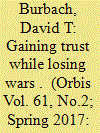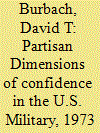|
|
|
Sort Order |
|
|
|
Items / Page
|
|
|
|
|
|
|
| Srl | Item |
| 1 |
ID:
135339


|
|
|
|
|
| Summary/Abstract |
Anarchy was coming to Africa, Robert Kaplan warned in 1994, and a surge in conflict initially seemed to confirm that prediction. With less fanfare, however, after the year 2000, conflict in Africa declined, probably to the lowest levels ever. Recent fighting in Libya, Mali, South Sudan and elsewhere has prompted a new wave of ‘Africa falling apart’ concerns. This article reviews the history and data of conflict in Africa, from pre-colonial times to the present. Historical comparison and quantitative analysis based on the Uppsala Conflict Data Program (UCDP) and Major Episodes of Political Violence (MEPV) datasets on the 1961–2013 period show that Africa has experienced a remarkable decline in warfare, whether measured in number of conflicts or fatalities. Warfare is a relatively low risk to the lives of most Africans. The years 2010–2013 saw an increase of 35 per cent in African battle deaths over 2005–2010, but they still are 87 per cent lower than the 1990–1999 average. Changes in external support and intervention, and the spread of global norms regarding armed conflict, have been most decisive in reducing the levels of warfare in the continent. Consequently, there is no Africa exception to the systemic shift towards lower levels of armed conflict.
|
|
|
|
|
|
|
|
|
|
|
|
|
|
|
|
| 2 |
ID:
155262


|
|
|
|
|
| Summary/Abstract |
During unpopular wars in Iraq and Afghanistan, the American public’s confidence in the U.S. military surprisingly rose to all-time highs. Confidence had been thought closely linked to battlefield success, so that increase was unexpected, and very unlike the crisis of confidence after Vietnam. Confidence can be better understood considering four dimensions: performance, professionalism, partisanship, and patriotism. The military has kept the public’s trust in part because, despite disappointing outcomes, it has not suffered organizational and professional breakdowns as happened after Vietnam. In addition, in the post-conscription era, expressing “confidence” is a low-cost way for disconnected citizens to express gratitude—even if they largely disagree with military preferences. Finally, a wide partisan confidence gap opened after 2003, suggesting that confidence increasingly reflects political identities rather than objective assessment of the state of the military.
|
|
|
|
|
|
|
|
|
|
|
|
|
|
|
|
| 3 |
ID:
165022


|
|
|
|
|
| Summary/Abstract |
Americans express more confidence in their military than any other institution. The components and causes of confidence have been little studied, especially as a partisan phenomenon. This study assesses trends in how partisanship and ideology affect confidence in the military. Multivariate analysis of General Social Survey and Harris Poll data shows that while confidence has increased for all demographic and political subgroups, partisanship and ideology play larger roles than commonly recognized. Democrats and Republicans are more confident than independents, but Republican confidence increased sharply over the last 20 years. Party ID is now the best predictor of one's confidence in the military. Conservative ideology has little effect, but liberalism reduces confidence, splitting Democrats. The pattern is not only “Republicanization,” however; partisans on both sides are more confident when their party holds the White House.
|
|
|
|
|
|
|
|
|
|
|
|
|
|
|
|
| 4 |
ID:
169353


|
|
|
|
|
| Summary/Abstract |
This study tests the congruence between public opinion toward funding US space exploration and previously theorized rationales to justify space activities and examines how those motivations differ by political party and how they vary from 1973 to 2016. General Social Survey data are used to measure correlations between space spending preferences and other spending categories that proxy proposed rationales, with mixed effects and ordinal logit regressions. Consistent with the scientific discovery rationale, support for funding space correlates with positive attitudes toward science. During the Cold War, a national security frame prevailed: Space and military preferences were correlated, with “hawks” supporting defense and space spending and “doves” opposing both. After the Cold War, Republicans continue to show strong space-military correlation, but for Democrats, space funding support now correlates with environmental protection preferences and not their military spending views. Both parties show slight negative correlations between space and social welfare spending. Overall partisan differences in funding preferences have not greatly increased, but diverging motivations have implications for future space politics.
|
|
|
|
|
|
|
|
|
|
|
|
|
|
|
|
|
|
|
|
|